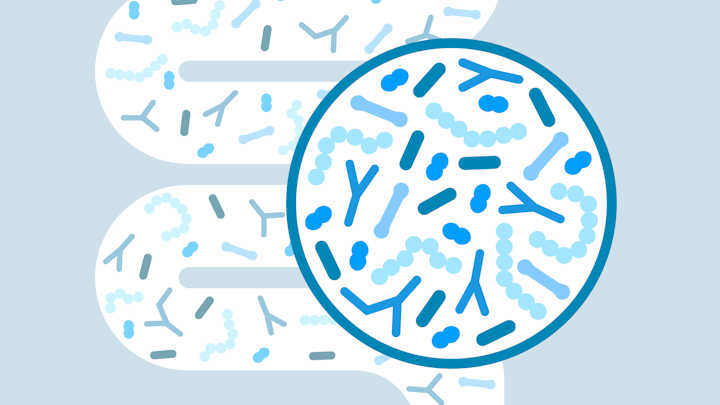
Professor Julie Gibbs
Julie is a Versus Arthritis Senior Research Fellow in the Division of Diabetes, Endocrinology and Gastroenterology. Here, she talks about her lab’s research into biological timing and the immune system.
 What does your lab research?
What does your lab research?
My lab researches mechanisms by which the circadian clock regulates the immune system and influences how the body responds to inflammatory challenge.
What are you working on at the moment?
Why do rheumatoid arthritis (RA) patients experience enhanced joint inflammation and pain in the early morning?
A focus of my laboratory is addressing how the circadian clock interacts with the immune system to impact on chronic inflammatory diseases such as RA. It has been known for decades that patients with RA report increased joint pain in the early morning – yet we have very little understanding of why this happens.
Our research in pre-clinical models of inflammatory arthritis has addressed how the local environment of inflamed joints changes over the course of the 24-hour day, identifying daily oscillations in transcriptional signatures and in the types of inflammatory cells present.
Our recent study highlighted daily changes in numbers of anti-inflammatory regulatory T cells (Tregs) within the joint – with numbers peaking when disease activity is at its lowest (Hand et al, 2020, Nature Communications). When in the joints, Tregs act to repress the activity of pro-inflammatory cells, including monocytes.
A major focus of the lab now is to further understand the role of Tregs in driving disease rhythmicity. Our newly established ARIA (Analysing Rhythmicity in Inflammatory Arthritis) study is using patient volunteer samples to characterise and phenotype the inflammatory environment of the joint at different times of the day.
By revealing mechanisms underlying the rhythmic behaviour of Tregs, we hope to facilitate the development of therapeutic strategies targeting these pathways.
How do 24-hour rhythms in the gut microbiome influence the immune system?
The gut microbiome is a major regulator of the immune system, with specific bacterial species and their metabolic outputs playing an important role in shaping the development of the immune system and supporting its function (Butler and Gibbs, 2020, Frontiers in Immunology).
Microbial dysbiosis is associated with multiple inflammatory diseases including rheumatoid arthritis and inflammatory bowel disease. The composition of the microbiota changes over the course of the 24h day, in part due to daily rhythmicity in host feeding-fasting cycles.
Work in our group has demonstrated dampening of these rhythms in the setting of inflammatory arthritis – with loss of rhythmicity in symbiotic species and microbial metabolites with known immune modulatory activity.
As this project progresses, we aim to understand when and how these changes in the gut microbiome occur, and what consequences this has on disease progression, co-morbidities and responses to therapeutics.
What have been the highlights of your lab’s work so far?
My early work in the field of chronoimmunology identified the importance of cell intrinsic clocks in regulating the function of innate immune cells (such as macrophages) and resident immune cells (such as lung bronchiolar cells).
Within the lung, we demonstrated that non-ciliated epithelial cells (Club cells) possess a robust clock, which regulates how they respond to inflammatory challenges such as Streptococcus pneumonia (Gibbs et al, 2014, Nature Communications).
The amplitude of the inflammatory response mounted, depends on what time of day the lung is exposed to this bacteria. Furthermore, genetic deletion of the clock within Club cells results in enhanced inflammation. These studies were among the first to recognise the importance of cellular timers in the regulation of inflammatory response.
What are the benefits of doing research at the University?
Within The University of Manchester, my research group is affiliated both to the Centre for Biological Timing and the Lydia Becker Institute for Inflammation and Immunity.
Consequently, we benefit from being surrounded by collaborators and colleagues with a vast array of expertise in circadian biology and immunology.
Our close proximity to the Manchester Royal Infirmary and the NIHR Manchester Clinical Research Facility makes us really well placed to obtain patient samples and to translate our findings from pre-clinical models to humans.
What have your previous lab members gone on to achieve?
Dr Devin Simpkins undertook her 4-year PhD in the Gibbs lab and defended her thesis in December 2022.
Her project focused on assessing the impact of inflammatory arthritis on the gut microbiome, using pre-clinical models of arthritis, flow cytometry, transcriptomics, 16S rRNA sequencing and metabolomics. Elements of her project were recently published in FASEB Journal (Simpkins et al, 2023).
Devin moved to the USA in 2023 to work as a post-doctoral research associate at Princeton University in the laboratory of Dr John F Brooks II, where she works on circadian regulation of host-microbe dynamics.
Learn more about Julie in the Research Explorer.






0 Comments